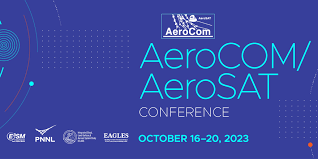The 22nd International AeroCom/AeroSAT Workshop Explores Advances in Aerosol Research
The 22nd AeroCom / 11th AeroSAT meeting convened from October 16-20, 2023, in Richland, WA, USA, blending virtual and in-person attendance. Co-hosted by Susannah Burrows (E3SM Atmosphere/EAMxx Deputy Group lead) and Andrew Gettelman (PNNL), the workshop attracted robust participation from international experts in the modeling and measurement of aerosol processes.
E3SM representatives took center stage at the workshop. E3SM Chief Scientist Ruby Leung kicked off the proceedings with a keynote talk giving an overview of the E3SM model. Presentations by E3SM scientists highlighted several novel aerosol features developed for E3SMv3, model development efforts to improve the aerosol forcing in E3SMv3, newly-developed diagnostic approaches, and scientific analysis of the E3SM model’s aerosols and aerosol-climate forcing.
For over twenty years, the Aerocom/AeroSAT community has significantly contributed to advancing global aerosol modeling by developing much-needed evaluation datasets and coordinating model intercomparison activities.
With presentations on topics ranging from deciphering aerosol types to grappling with the intricacies of deriving air quality from satellite data, the 2023 AeroCom/AeroSAT workshop showcased the international research community’s collective dedication to advancing aerosol research for climate, weather, and air quality applications.
Among the major themes of the 2023 workshop was the research community’s recent development of several new methods for diagnosing the climate impacts of aerosols via aerosol-cloud interactions. Among these, presentations by E3SM team members Johannes Mülmenstädt and Naser Mahfouz highlighted a method developed by E3SM researchers that enables new insights into how specific physical mechanisms control whether and how marine clouds brighten or darken in response to increases in aerosol concentrations (Mahfouz, Mülmenstädt, and Burrows, 2024 [preprint]).
Other major themes included the simulation of specific aerosol processes, and the evaluation of those simulations in different models. Several presentations highlighted new aerosol features developed by the E3SM project for the upcoming v3 release. An overview of E3SMv3’s new aerosol features was given by Hailong Wang, and further presentations highlighted E3SMv3’s updated treatment of secondary organic aerosol (Manish Shrivastava) and improved dust emissions (Yan Feng). A presentation by Yunpeng Shan highlighted improvements to the removal of aerosol by precipitation, which have contributed towards reducing the aerosol forcing on climate in development versions of the E3SMv3 atmosphere model.
In particular, the treatment of nitrate aerosol was highlighted as a key area of uncertainty for the simulation of future particulate pollution. Models are expected to simulate an increasing importance of nitrate aerosol in the future, but uncertainties in both the emissions of its precursors and the governing atmospheric chemistry make its simulation an important scientific challenge for the aerosol community. A novel treatment of nitrate aerosol will be available as a research capability in E3SMv3 and was highlighted in a presentation by Mingxuan Wu.
Additional presentations highlighted development and applications of E3SM by DOE ecosystem projects. These included several presentations on work performed by the EAGLES project (Enabling Aerosol-cloud interactions at GLobal convection-permitting scalES), which is developing new aerosol parameterizations targeting the E3SMv4 atmosphere model. A presentation by E3SM collaborator Daniel McCoy highlighted more systematic approaches that are being developed for using observations to constrain uncertainty in climate predictions, which are underway as part of the DOE EPSCoR project, PROCEED.
Following the workshop, E3SM scientist Johannes Mülmenstädt joined the AeroCom/AeroSAT Scientific Steering Committee, where he will help to guide the planning and scientific directions of future workshops and model intercomparison experiments coordinated by AeroCom/AeroSAT.
The E3SM project provided partial funding support for this workshop.
Resources
- AeroCom/AeroSAT meeting website
- 2nd AeroCom/AeroSAT program and abstracts
- AeroCom website
This article is a part of the E3SM “Floating Points” Newsletter, to read the full Newsletter check:



